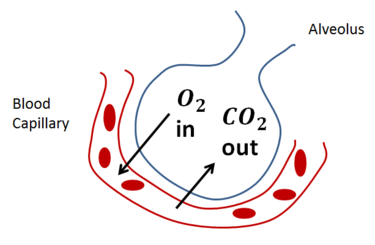Ok, I like to write about bad science that I see in the movies. I think it's fun to use movies to segue into a real discussion about science. Today I was watching The Magic School Bus with my kids and, as usual, I started over-thinking everything. I realize, of course, that The Magic School Bus isn't supposed to be scientifically accurate. It's a way to introduce kids to science (or rather, scientific facts) in a way that keeps them entertained. That being said, I couldn't get this thought out of my head: When the students shrink what happens to their internal organs?
 |
| Ms. Frizzle: An administrative nightmare |
More specifically I was wondering how blood transportation would work. Here's how normal respiration works:
When you breath in O2 it enters your lungs and makes its way into the alveoli - small pockets in your lungs that fill up with gas (ideally oxygen). There's a lot of interesting gas dynamics that happen here, but I'll keep it short by saying that O2 is transported from the gas phase (lungs) into liquid phase (blood).


 |
| The alternating red and blue colors are to help you visualize the different binding areas. They're really all the same. Image credit: Wiki commons |
So, if Ms. Frizzle's class shrinks down to investigate a flower, bake a cake, or investigate the insides of one of their classmates, the hemoglobin must shrink with them. The binding between oxygen and hemoglobin depends on their size similarities, so when they breath in oxygen it would be unable to bind to the hemoglobin in their body; Asphyxiation would be the immediate result of shrinking. This is the same story with Honey I shrunk the kids. Being small make it impossible to breath.
The only explanation I can think of is maybe there's some kind of school bus magic that shrinks the oxygen down as they inhale. This would actually help explain another problem - how does Arnold suffer from pollen allergies when he's smaller than pollen? If the pollen around him shrinks as he inhales then being small is no cure for his allergy woes. This explanation brings new problems with it, though. If the oxygen shrinks to enter your lungs then it takes up less space (obviously). This means that the pressure gradient between outside your body and inside your lungs changes, allowing more oxygen to flood in - and shrink again. It seems to me that oxygen would flood in your lungs until they burst.
| Hmmm . . . I really didn't think this would end this morbidly. |
Of course if we're talking about a Magic school bus I guess "magic" is always a valid answer, right?
